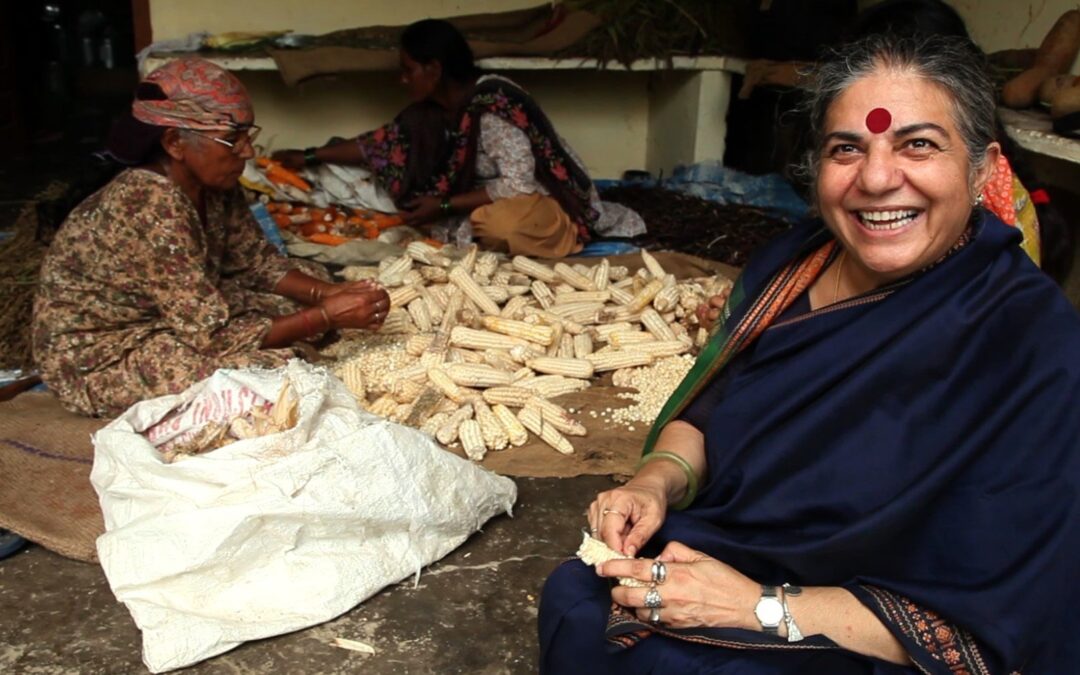(Becket Films)
Roco Films, 2021. Documentary. 82 min.
Grade: 3.5 out of 4
Vandana Shiva seems like someone who ought to have multiple movies about her at this point, but for now, The Seeds of Vandana Shiva will do. The septuagenarian activist is first shown in a field, taking a phone call, and then, via the magic of montage, rushing into action almost Batman-style to speak out against environmental injustice. Traimed in both science and philosophy, highly intelligent, and a devotee of both Einstein and Gandhi, Shiva has devoted her life to proving that longterm sustainability is ultimately more profitable than short term environmental pillaging, and continues to fight GMO foods and their availability in India.
Don’t go into this movie expecting debate – there’s some lip service given to a New Yorker article that attacks her, but no real details about what was said in it. And considering she opposes some deep-pocketed companies like Monsanto, it’s hard to tell what criticism of her might be legitimate versus a well-funded smear, and likewise how much she ought to actually address at all. It’s up to the audience to assess her well-articulated case, and since the film feels like a call to action, one assumes any viewer moved to take such action will do all the research they need when the time comes.
It is perhaps unsurprising that despite being an activist for many years, one who was there when the term “Tree-hugger” was coined to mock the literal actions of the Chipko protesters in the ’70s, who challenged Indian custody laws at the Supreme Court level and forced them to stop automatically favoring fathers, and who arguably invented the intersectional term “eco-feminism,” Shiva remains relatively unknown over here. For all the conversations about partisan media we have in this country, eloquent critics of large-scale capitalistic institutions like industrial farming don’t get regular guest spots even on MSNBC. Let this documentary serve as a corrective.
Shiva narrates the film herself, frequently on camera, interspersed with key vintage footage and modern hi-definition camerawork that visually cherishes every dewdop. She notes how she was trained in atomic science but never once taught about the dangers of radiation, and once she learned, vowed not to separate cause and effect like that again, which led to her interest in quantam entanglement. Disagree with her if you will, but she is almost certainly smarter than you. (Hence the lack of U.S. TV time, again.)
Nowadays we talk about the “Green Revolution” to mean protests in Iran, but for Shiva it refers to the importing of pesticide-based agriculture to the Third World, and, in her opinion, the mostly negative consequences thereafter. She deftly analyzed some of the supposed religious conflicts that ensued, and found that in fact they were mostly about profiteers versus the penalized; expanding on this, she believes most conflicts judged to be about religion are actually about something else, but it’s easier to blame irreconcilable faiths than business moves that could be reversed but at the expense of massive short-term profit. (One wonders what she must think of the current red vs. blue struggles here that the American right likes to frame as True Christianity versus godless liberal Marxism.)
Considering she commands a hefty fee as a public speaker – something right-wing critics point to as hypocrisy, as if plane trips from rural India are easily accessible to all otherwise – it’s no surprise Shiva remains a compelling talker throughout. Opening up first about herself and her past, she builds from points we all should agree on – pesticides have harmful side-effects, homegrown food tastes better – to larger arguments and conclusions we can maybe see our way to. One suspects she’d be compelling no matter who trained the camera on her, but directors Camilla and James Becket keep the visuals appropriate and flowing to enhance the points made.
Religious conservatives who put out movies like Unplanned are fond of saying, “See the film yourself and make up your own mind”…after which they tend to get upset anyway if you don’t promptly make it in their direction. We’ll see how many are willing to do so the other way, especially since most rural populists could hardly disagree with Shiva’s point that a small farmer is “the last free person on Earth.” Inherent in that argument is the notion that libertarianism must eventually choose between genuine small businesses and really big, monolithic ones. She’s already picked a side – will you? However you ultimately make up your own mind, you likely won’t forget hers.

